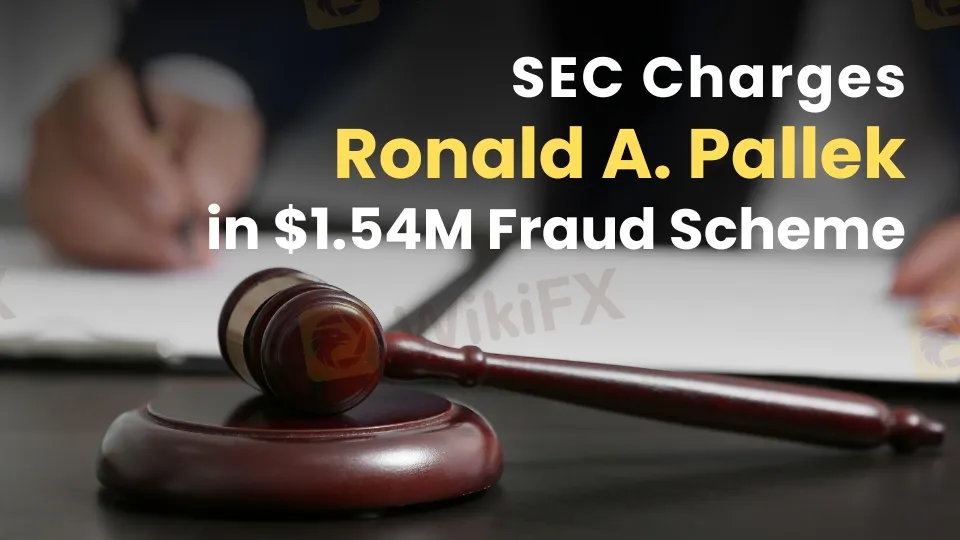简体中文
繁體中文
English
Pусский
日本語
ภาษาไทย
Tiếng Việt
Bahasa Indonesia
Español
हिन्दी
Filippiiniläinen
Français
Deutsch
Português
Türkçe
한국어
العربية
SEC Charges Ronald A. Pallek in $1.54 Million Fraudulent Investment Scheme
Abstract:SEC sues Ronald A. Pallek for a $1.54M fraudulent scheme, alleging false promises and Ponzi-like payments to investors.

The Securities and Exchange Commission (SEC) has launched a legal battle against Ronald A. Pallek, accusing him of masterminding a deceptive securities fraud scheme that swindled over $1.54 million from unsuspecting investors. The complaint, filed on March 10, 2025, in the Wisconsin Eastern District Court, paints a grim picture of greed and betrayal spanning from February 2021 to September 2023.
Pallek allegedly lured at least 87 investors with the tantalizing promise of doubling their money in just one year through an options trading strategy known as the “Iron Condor.” But behind the bold claims was a web of lies. The SEC asserts that Pallek misrepresented the risks tied to his trading tactics, fabricated details about how investor funds would be used, and even assured people he had a safety net of reserve funds to offset losses—none of which was true.

The reality was far bleaker. Palleks trading ventures hemorrhaged nearly $991,000, a fact he concealed by sending investors falsified account statements that boasted fictitious profits. To keep the illusion alive, he siphoned some of the incoming cash to pay early investors in a classic Ponzi-like maneuver, delaying suspicion as his scheme unraveled.
When desperate investors demanded their money back in the fall of 2023, Palleks excuses grew bolder. He claimed his bank accounts were frozen—a lie bolstered by forged documents he crafted to show balances exceeding $1.25 million. In truth, the funds were long gone, squandered on failed trades or redirected to prop up his crumbling facade.
The SEC has charged Pallek with violating key provisions of U.S. securities laws, including Section 17(a) of the Securities Act of 1933, Section 10(b) of the Securities Exchange Act of 1934, and multiple related rules under the Investment Advisers Act of 1940. The agency is now pushing for a permanent injunction to halt his fraudulent activities, alongside demands for disgorgement of ill-gotten gains, prejudgment interest, and hefty civil penalties.

Disclaimer:
The views in this article only represent the author's personal views, and do not constitute investment advice on this platform. This platform does not guarantee the accuracy, completeness and timeliness of the information in the article, and will not be liable for any loss caused by the use of or reliance on the information in the article.
Read more

Kraken Launches Forex Perpetual Futures on Kraken Pro Platform
Kraken Pro adds forex perpetual futures (EUR/USD, GBP/USD) with 20x leverage, blending crypto and traditional markets. Explore stocks, ETFs, and crypto debit card features.

Beware of Gold Bar Investment Scams: Rising Threats
Gold bar scams surge in 2025 as gold prices hit $3,000/oz, targeting seniors. Learn how scammers exploit trust in gold and tips to avoid these frauds.

Think Scams Won’t Happen to You? That’s Exactly What Scammers Count On
We live in a world where information is everywhere. People are more digitally literate than ever before. Financial education is just a few clicks away. And yet, investment scams are not going away but they’re getting worse. It’s tempting to think that only the gullible fall for these tricks. But that’s far from the truth. Why? Because investment scams don’t target your knowledge. They target your emotions.

RM15 Million Gone in Fake Investment Scam
A 77-year-old Malaysian retiree has suffered financial losses totalling RM15.1 million after falling victim to an elaborate share investment scam orchestrated by an individual she knew personally.
WikiFX Broker
Latest News
eXch Exchange to Shut Down on May 1 Following Laundering Allegations
Think Scams Won’t Happen to You? That’s Exactly What Scammers Count On
Beware of Gold Bar Investment Scams: Rising Threats
Over $4 Billion Laundered Through Crypto Scams in Paraguay
Currency Calculator


